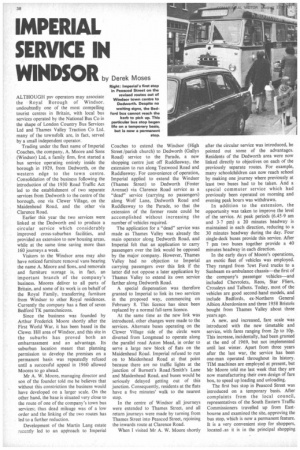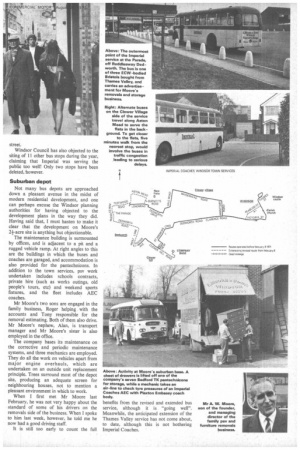IMPERIAL SERVICE IN
Page 40

Page 41

If you've noticed an error in this article please click here to report it so we can fix it.
WINDSOR by Derek Moses
ALTHOUGH psv operators may associate the Royal Borough of Windsor. undoubtedly one of the most compelling tourist centres in Britain, with local bus services operated by the National Bus Co in the shape of London Country Bus Services Ltd and Thames Valley Traction Co Ltd, many of the townsfolk are, in fact, served by a small independent operator.
Trading under the fleet name of Imperial Coaches, the company, A. Moore and Sons (Windsor) Ltd, a family firm, first started a bus service operating entirely inside the borough in 1929, from Dedworth, on the western edge to the town centre. Consolidation of the business following the introduction of the 1930 Road Traffic Act led to the establishment of two separate services from Ded worth to the centre of the borough, one via Clewer Village, on the Maidenhead Road, and the other via Clarence Road.
Earlier this year the two services were linked at the Dedworth end to produce a circular service which considerably improved cross-suburban facilities, and provided an extension to new housing areas, while at the same time saving more than 160 journeys a week.
Visitors to the Windsor area may also have noticed furniture removal vans bearing the name A. Moore and Sons, and removals and furniture storage is, in fact, an important branch of the company's business. Moores deliver to all parts of Britain, and some of its work is on behalf of the Royal Family, transferring furniture from Windsor to other Royal residences. Currently the company has a fleet of seven Bedford TK pantechnicons.
Since the business was founded by Arthur Frederick Moore shortly after the First World War, it has been based in the Clewei Hill area of Windsor, and this site in the suburbs has proved both an embarrassment and an advantage. Its suburban location meant that planning permission to develop the premises on a permanent basis was repeatedly refused until a successful appeal in 1960 allowed Moores to go ahead.
Mr A. W. Moore, managing director and son of the founder told me he believes that without this constriction the business would have developed on a larger scale. On the other hand, the base is situated very close to the route of one of the company's town bus services; thus dead mileage was of a low order and the linking of the two routes has led to a further reduction.
Development of the Martin Lang estate recently led to an approach to Imperial Coaches to extend the Windsor (High Street/parish church) to Dedworth (Gallys Road) service to the Parade, a new shopping centre just off Ruddlesway, the extension to run along Testwood Road and Ruddlesway. For convenience of operation, Imperial applied to extend the Windsor (Thames Street) to Dedworth (Foster Avenue) via Clarence Road service as a "dead" service (carrying no passengers) along Wolf Lane, Dedworth Road and Ruddlesway to the Parade, so that the extension of the former route could be accomplished without increasing the number of vehicles required.
The application for a "dead" service was made as Thames Valley was already the main operator along Dedworth Road, and Imperial felt that an application to carry passengers over the link would be opposed by the major company. However, Thames Valley had no objection to Imperial carrying passengers over this link if the latter did not oppose a later application by Thames Valley to extend its own service farther along Dedworth Road.
A special dispensation was therefore granted to Imperial to link its two services in the proposed way, commencing on February 8. This licence has since been replaced by a normal full-term licence.
At the same time as the new link was introduced, other changes were made to the services. Alternate buses operating on the Clewer Village side of the circle were diverted from Longmead to operate along the parallel road Aston Mead, in order to serve a large new block of flats on the Maidenhead Road. Imperial refused to run on to Maidenhead Road at that point because there are no traffic lights at the junction of Burnett's Road/Smith's Lane and Maidenhead Road, and buses would be seriously delayed getting out of this junction. Consequently, residents at the flats have a five minutes' walk to the nearest stop.
In the centre of Windsor all journeys were extended to Thames Street, and all return journeys were made by turning from Thames Street into Peascod Street, rejoining the inwards route at Clarence Road.
When I visited Mr A. W. Moore shortly after the circular service was introduced, he pointed out some of the advantages. Residents of the Dedworth area were now linked directly to objectives on each of the previously separate routes. For example, many schoolchildren can now reach school by making one journey where previously at least two buses had to be taken. And a special commuter service which had previously been operated on morning and evening peak hours was withdrawn.
In addition to the extension, the opportunity was taken to improve the level of the service. At peak periods (6.45-9 am and 3-7 pm) a 20 minutes headway is maintained in each direction, reducing to a 30 minutes headway during the day. Four single-deck buses provide this service. After 7 pm two buses together provide a 40 minutes headway in each direction.
In the early days of Moore's operations, an exotic fleet of vehicles was employed. They ranged from 7cwt Ford trucks to a Sunbeam ex-ambulance chassis—the first of the company's passenger vehicles—and included Chevrolets, Reos, Star Fliers, Crossleys and Talbots. Today, most of the vehicles are good second-hand models, and include Bedfords, ex-Northern General Albion Aberdonians and three 1958 Bristols bought from Thames Valley about three years ago.
A new, and increased, fare scale was introduced with the new timetable and service, with fares ranging from 2p to 10p. This increase, incidentally, had been granted at the end of 1969, but not implemented until last winter. Apart from three years after the last war, the service has been one-man operated throughout its history. TIM machines are employed at present, but Mr Moore told me last week that they are now manufacturing their own design of fare box, to speed up loading and unloading.
The first bus stop in Peascod Street was introduced on a temporary basis. After complaints from the local council, representatives of the South Eastern Traffic Commissioners travelled up from Eastbourne and examined the site, approving the bus stop, which is now a permanent feature. It is a very convenient stop for shoppers, located .as it is in the principal shopping street.
Windsor Council has also objected to the siting of 11 other bus stops during the year, claiming that Imperial was serving the public too well! Only two stops have been deleted, however.
Suburban depot
Not many bus depots are approached down a pleasant avenue in the midst of modern residential development, and one can perhaps excuse the Windsor planning authorities for having objected to the development plans in the way they did. Having said that, I must hasten to make it clear that the development on Moore's 2+-acre site is anything but objectionable.
The maintenance building is surmounted by offices, and is adjacent to a pit and a rugged vehicle ramp. At right angles to this are the buildings in which the buses and coaches are garaged, and accommodation is also provided for the pantechnicons. In addition to the town services, psv work undertaken includes schools contracts, private hire (such as works outings, old people's tours, etc) and weekend sports fixtures, and the fleet includes AEC coaches.
Mr Moore's two sons are engaged in the family business, Roger helping with the accounts and Tony responsible for the removal estimating. Both of them also drive. Mr Moore's nephew, Alan, is transport manager and Mr Moore's sister is also employed in the office.
The company bases its maintenance on the corrective and periodic maintenance systems, and three mechanics are employed. They do all the work on vehicles apart from major engine overhauls, which are undertaken on an outside unit replacement principle. Trees surround most of the depot site, producing an adequate screen for neighbouring houses, not to mention a pleasant environment in which to work.
When I first met Mr Moore last February, he was not very happy about the standard of some of his drivers on the removals side of the business. When I spoke to him last week, however, he told me he now had a good driving staff.
It is still too early to count the full benefits from the revised and extended bus service, although it is "going well". Meanwhile, the anticipated extension of the Thames Valley service has not come about, to date, although this is not bothering Imperial Coaches.




















































































